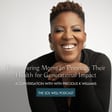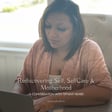Introduction to Soul Well Podcast
00:00:05
Speaker
Welcome to the Soul Well Podcast, where moms of color find strength and community in the mental health space. Each week we ignite inspiration as we set our intentions with affirmations and dive deep into honest conversations with fellow moms and mental health experts. We're here to
Podcast Mission and Intentions
00:00:21
Speaker
hold space for you, to shatter stigmas and elevate the voices of moms of color. We'll fight for policy change, empower you with mindful resources, and most importantly,
00:00:31
Speaker
remind you that you're never alone on this journey. It takes a village to raise a mother. Now let's meet at the well.
Today's Topic: Money, Motherhood, and Mental Health
00:00:42
Speaker
Hey mamas, welcome back to the Sew Well podcast. I'm your host, Autumn Colon. In today's episode, we are talking about money, honey, and getting to the money bag. We are talking about man and the money, motherhood, and mental health. And my guest today is Alison Nickerson. Alison is a wife of one, mom of three, who learned through postpartum anxiety, therapy, hardship in her marriage, and drug trauma, how closely mental health connects to our financial journey. As a wealth
00:01:13
Speaker
and wellness coach and the host of the One Mom in a Dream podcast. She dedicates her services to help moms and women of color gain confidence in money management by using the money they have to live the life they desire. And this episode was really good because I don't know about y'all, but talking about money and growing up in an environment where that those types of conversations with transparent was not my reality. And so I can admit that I have had some financial anxiety in my own life and she really helps to kind of bring some clarity to that.
00:01:49
Speaker
She talks about her experiences, suggestions, tips, accounts she should be considering. So there are gems dropped in this episode that you do not want to miss. But before we jump into our episode, you know how we do, we are going to be picking an affirmation card from a DEC. And today's DEC is the Black Girl Affirmed by OKNRX. And our card reads,
00:02:16
Speaker
I feel supported and safe within my sisterhood. I feel supported and safe within my sisterhood. So if you are someone who are looking for your own sisterhood, the mom space is launching on October the 10th, 2024, our doors are opening. So it's a line that this is the card today, because I did want to share that with you. If you are looking for a space where moms of color are coming to connect about their motherhood and mental health experiences and their journey,
00:02:50
Speaker
you want to be in the mom's face because it is meant for you. The show notes will have a link for how to gain access to the group. But if you have any questions, you can always reach out to us on our social channels at so
Importance of Money and Mental Health Discussion
00:03:06
Speaker
well. And with that, let's jump into today's episode. I have with me Alison Nickerson. Hi, hi ladies.
00:03:15
Speaker
I'm so excited. we were um Before we press record, we were like getting into a conversation and I'm like, wait, let's press record so we can actually give the tea to the people too. So I'm so excited um for y'all to be listening on this conversation because we are talking about money.
00:03:34
Speaker
mental health and motherhood. So Allison, talk to us a little bit about your who you are, your journey, um and the impact on motherhood in your relationship with money.
00:03:47
Speaker
Yes, so actually my name is Allison. I am a wealth and wellness coach and I specifically um client moms and a woman of color. My um duty that I feel like God has given me is just to serve moms and so in a journey of really Finding myself,
00:04:08
Speaker
so postpartum depression, postpartum anxiety, bad habits, all the things right that happen with being a woman and all things happen with being a mom. um it just A lot of things that I was discovering as I was evaluating my mental health um also get tied to money.
00:04:26
Speaker
And so, and not everything, right? Some things are just things you have to find for within. What what kind of atmosphere makes you productive, right? um You know, what are some things whenever you're down that can bring you in a good mood, like a movie or something like that. But um whenever I was realizing, it becomes like my family life.
00:04:44
Speaker
and how I want to provide from them. I was very dissatisfied with not only myself but my responses um to my children at times. If they that they want to go have some ice cream and I'm like okay let me go look at my money and let me see if we get ice cream but we can get actually we can't get sprinkles so okay because sprinkles is extra.
00:05:05
Speaker
So there were just some times where it just felt, you know, you just feel bad. You have that mom guilt where you got to tell your kids no on the simple things of life. And so that made me really want to evaluate my relationship with money and um and let make me do a closer look on one, the kind of life that I wanted to live. And then two, what I have right now, what can I do with right now and how can I take right now and turn and start turning it into the life that I desire?
00:05:33
Speaker
so Yes, I love that. Listen, I need this conversation today. So I am like, yes, because when you when you were mentioning like going through your journey and your mental health and how it can be linked to finances, I don't think that that's something that a lot of people talk
Cultural Taboos and Financial Discussions
00:05:53
Speaker
about openly. Number one, Black and brown people, we get so ah you know scared talk right like scared to talk about money like I know people I remember there was this like don't tell people how much you get paid because you know like there was this is rhetoric in the community of like oh we don't talk about finances but it's like one of the one of the major contribut contributions of divorce um mental health issues I mean poverty we can't I mean like so many things so I'm so happy that you're here today to just like shine a light on that
00:06:24
Speaker
and to talk about your journey and how you help women to go, you know, to manage that. Can you talk about just the impact that you've experienced on overall mental health and well-being, whether it be like with yourself or any of your clients? Sure, of course. oh So I'll talk about my success stories and I'll mention some of clients. So with myself,
00:06:48
Speaker
um I looking back, I have panic attacks throughout my childhood. and I didn't realize then I didn't realize I realized they were panic attacks, right? Because the hospital you go to the hospital, your parents don't know why you're hyperventilating like this, you can't talk. Whenever that happens, and you go to a hospital a couple of times for panic attacks, and you realize, okay, I need to start talking more.
00:07:13
Speaker
who I grew up, my my brother and I have such a huge age gap that we were pretty much raised as only children. He's 19 years old.
Overcoming Postpartum Challenges
00:07:21
Speaker
So whenever you're raised like that, um you learn to be by yourself. And you talk to anybody because you're a kid with two parents. And so you keep a lot of things in. And so that was my first um recollection of mental health was I'm talking more about my feelings and emotions.
00:07:40
Speaker
best to becoming, getting married, becoming a mom, adjusting with having one kid and then having two under two. That's, I feel like that's a lot of people going from one to two babies. ah After that, you're fine. Yeah. That's a lot. Okay.
00:08:01
Speaker
and That is where I was going through a lot of postpartum depression. um I fell into alcoholism. My husband and I actually both fell into alcoholism. um Had a lot of bad habits. We were not talking to each other. A lot of screaming, a lot of mom rage. Screaming, yelling. um Because I was just so frustrated with things. And I couldn't say how I felt, but I knew how I felt, but I couldn't verbalize it. So it was just of talking without talking like letting the emotion out but not saying how I felt and um my biggest breaking point is whenever I switched from one ah career field to another it was in um and uh god oh my I can't remember the name auto adjuster agent that was the most stressful job of my life you hear me
00:08:54
Speaker
um but job of my life because it was so metric. It was so yank by this and I was at that job for 10 months. I had a mental breakdown and it put me on leave for like a month. and But ah um a big I went to therapy for a year after that. ah I still go to therapy periodically, but I was there consistently for maybe about a year, year and a half. And I just really had to figure out ways that I can make myself happy. and
00:09:32
Speaker
And that included jobs, that included making money, that included with my household, that included with my kids, adequate a lot of different facets of what makes me happy. How can I start expressing that to my husband? My husband now have a better line of communication than whenever we first started getting married.
00:09:52
Speaker
totally different. So we have Carolina communication. ah Sometimes I can't talk to him, but I can text him. Yeah. Oh, sometimes writing is so much for me to do versus talking. And so um those are just been some different things with my
Mental Health and Financial Management
00:10:09
Speaker
mental health journey. And now I know in certain situations, there are things I can do. And there are things I can't do that the situation as a whole. um sort Or um a And so and on the money side of that, there are certain things that I do like to do. Of course, as a mom, you want to be able to do things with your kids, and you feel like you don't have a lot of money, then you feel like some of the... I grew up very differently. I grew up going to a private school. I grew up going on multiple vacations a year.
00:10:43
Speaker
just different things for me versus but it was just my parents and I versus two parents and three children yeah it's a different kind of dynamic never comes to your money and so now i have to figure out different ways that we can have fun and the good thing is that kids are pretty easy but but as a as a parent i you just want to do more you just always want to do more you always want to give your kids more and so i had to figure out how to get to that more and that's whenever i started digging into my money journey budgeting um moving my money around using credit card points that has been like our god sent credit card whenever we that has paid for our bay our hotels the last two years for credit card points
00:11:28
Speaker
Yes. So doing different things like that and the finding and the researching and now being able to share that with clients who have money anxiety. I've had clients that don't at beginning the beginning didn't even open bank account because they had so much anxiety just to look at their bank account. But now having savings accounts and understanding that after we did their budget, they said, Oh, I'm not broke. I said no.
00:11:53
Speaker
yeah Why you thought that home I've had clients to after our first session together um We're paying off credit cards where they thought I could only put $40 and $50 where we were looking at their $300 balance on my you can pay that right now and then gosh you just don't know because you don't sit down we don't look at it overall as a whole we look at things sometimes piece by piece day by day and we have to start evaluating things better and so yeah um it's been amazing to now be on this side and to continue to grow in that sense but yeah mental health was definitely my first
00:12:35
Speaker
relief or understanding to then get to the money, the money bag, like sites. Yeah, yeah.
Understanding Financial Behaviors
00:12:43
Speaker
That's so cute. Get to the money bag and then be like, Oh, okay. If I didn't have the mental health first, I wouldn't have been able to look at the money bag and analyze. Yeah, yeah.
00:12:58
Speaker
I love that. I love that. I was going to ask you if you could, first of all, Money Bad. That's so cute. Explain how you came up that and what that is.
00:13:09
Speaker
Um, you know, I can't even even tell you. Look, I thought that was a thing. Maybe it just hanging up in my head. But as I um was really evaluating my branding as I was shifting from, I did a random um budgeting class and I had so much more feedback than these mental health classes I was trying to do. yeah And so as I was looking at my branding and my content, I was like, okay, what is my content going to be? And I was like,
00:13:37
Speaker
motherhood, mental health, my dad, bam. Yes. I love it. That's so cute. um I love it. And i um I'm a marketing girl. So things that have like a little like a little please. Yes, I love that. I'm like all about motherhood, mental health and marketing. So it's like, those are my three ends.
00:14:02
Speaker
I need to add money back on there because clearly I need to save it. But can you talk about one of the things that you said was that you work with women who have money anxiety. um Can you explain like what money anxiety is or any of the other like challenges that you see? Like I know people sometimes have like a sacredy mindset, right? Where they're just like,
00:14:26
Speaker
so scared to spend money, right? Or you have people who overspend or they, you know, when they're, you know, in a manic, um, state, they may be shopping more than they should be, right? Like, ah you know, so what types of things are you seeing in the community? So you actually brought up two or three types of people that um I really like to, I like to bring up, excuse me, and and focus on. So some of those are, so three things, like you have money anxiety, that is for the mom that can't open her bank account,
00:15:02
Speaker
that is she may think that she's frugal but she's really like scared to spend things. um She can also be um the the woman that has a lot of savings because she's so scared but it's like okay we got we got enough.
00:15:19
Speaker
but another goal, you kind of have to detour. So you have some money anxiety. You have of um the money over one or over a fender and that is where like you were saying you may have that person that's doing well and something happens they feel like they got to shop or spend money or get things out and that might be the person that you have to kind of hone in in regards to their FOMO a little bit. You may have to it's like okay we can do you have to kind of set limits.
00:15:48
Speaker
you You can go shopping. That's fine. But let's not spend all our money. Let's figure out how we can start moving money away or for me, because i I can be that girl. If I see I got a little extra money, I'm like, Oh, what's in my Amazon save a letter list? What can I get? because ah So I have to literally move money to a different account for my savings is in a whole different bank account. So I don't see it smart. That's so smart.
00:16:15
Speaker
really move money from my checking to my savings back to my checking. is and in there it's right and so or this may be the person that has credit card debt um that has just spent so much on their credit cards because they just don't even realize like oh i can pay the minimum balance but that minimum does not pay the balance right right it's just um so those that that one has a lot of facets to it but the last one is the money savior the money savior is uh where you kind of get into your people pleasing the person that wants to help typically it's like the oldest daughter
00:16:50
Speaker
um or the only daughter or you're the daughter of a single mom who doesn't want to I've done I've given everything to you now you got to give back to me and you have Teach that woman to set boundaries And that you can't help anybody if you have nothing else to give you can't know if you're giving and giving to so many people so um There are so many different mental parts of each one of those women. And so that's where I talk and we ask questions like, what's your first memory of money?
Emotional Triggers and Financial Habits
00:17:25
Speaker
You know, what is your, um how do you feel about opening your bank account? You know, what are some things that trigger you? Okay.
00:17:33
Speaker
What are some things that trigger you whenever you spend? Or one of the things I learned from reading A Financial Feminist was um having a money diary. Whenever you spend money, what is your emotion behind it? Are you just spending frivolously? Or whenever you're spending, do you feel good about this spending? Or whenever you bought that thing just because it was on sale? Did you really like it? Were you really happy about it? Or did you just buy it because it was on sale? You felt like you were saving money.
00:18:03
Speaker
but Because a lot of times we do that, like girl, this thing was $2, but are you going to wear it? It's not even your size. like
00:18:13
Speaker
So did you just spend $2 on something that you're never going to wear? You know, things like that. There is a mental health component behind our spending, whether we're giving it away, we're spending on ourselves, or we're not even looking at it. There's a mental component to it. and We have to figure out what that is to help us. Then on the back end, let's re um Let's reshape it so that you can see like, okay, this is how I looked at money, this is well how I need to look at money, and this is what I want to do with my money.
00:18:48
Speaker
Yes, perfect. I love that that kind of answer my next question, which was going to be like, how do you help women overcome these things, right? Like, you know, you identify someone who's in one of those categories, like, what are the steps to, you know, getting your money management under control while managing your mental health while being a mom, i'm like, it's a lot, you know, because, you know, you have dealing with your kids, you got your household, you got your household expenses, you got your budget and you got your unexpected expenses, you got your kids activities. I mean it's so much like how do you help moms get to a point of feeling like they have a good relationship with money.
00:19:30
Speaker
Yeah, I think the biggest thing is that um one is understanding that like, as your money coach, I probably gonna do the same thing you're going through as far as the balance thing, right? I think that relatability helps. You're not like some random man, or some other person that is not living the same life as you. You're talking is going through those things but the first thing that we do um the first session i do in my program is i make them let's pull out our money let's open up our account let's go through all our bills and we're going to understand how much money we have versus what we're really working with is there anywhere we could cancel any of these things out and some people they're like no i'm like okay well if we don't do this then we can't do this and house and you want to save money you want to do all these things
00:20:21
Speaker
But we have to figure out somewhere some pushback. So um sometimes it is just helping people realize like how much money they have and what they're really spending their money on. Right. And um really understanding that number, especially if I tell them to open up their statement.
00:20:38
Speaker
and open and then we start and then eating out. Oh, I go to Target and how many times I'm spending money on it. And then I'd be like trying to justify, you know.
00:21:02
Speaker
it is it is i had one mom and she she was a character i love her so much but um so you know it's sections and we're going through category i'm like all right you give me like the full like what's your category for eating out she was like you have a calculator i said okay she just went down the line and we were just adding up total we were adding up totals and it wasn't i mean compared to how much money they were bringing into her husband bringing into the household and what she was putting out it wasn't a bad number but she was so ashamed but going back and looking at your statement it was just like i mean it's okay but we just gotta figure out do you want to spend that much money on eating out or do you
Societal Pressures on Finances
00:21:41
Speaker
want to eat in more like or do y'all want to crush or like it's okay but yeah then yeah yeah it's the thing that we forget the most it's like 10 50 dollars a week and it's like it's 150 yeah i think we face the number but it's the it's different One of the things that um I wanted to talk about, because we kind of got into it a little bit when we were talking about pressure um and kind of like, what is like, what do you think about like societal pressures and expectations around finances? Like, how does that contribute to
00:22:20
Speaker
stress and anxiety, whether in yourself or any of the clients that you're seeing. Because I feel like, number one, we have social media, right? There's that FOMO vibe. There's that want to be involved. There's other moms in the community. There's other parents. There's expectations, right? So um what kind of pressures are you seeing and how do they contribute to stress and anxiety?
00:22:44
Speaker
The pressure that I see the most from culture, um I think if we talk about social media, it is some of that FOMO. It is some, and I want to be there, man, I want to have that. And ah sometimes you got to stop following those accounts, man. You got, you got to, it's not doing anything, but just breaking you down. um But some pressures like from,
00:23:13
Speaker
Some pressures that I have had from work um that I have had to eliminate is um the word no.
00:23:23
Speaker
it it It is the word. No, um just to um sometimes you can't making stuff that your boss wants to give you a reward in the end. If you know, like you're being overworked, um just to oh, I got to do it just to make my paycheck. I cringe. I.
00:23:45
Speaker
at because but it's so true because somewhere so dependent you're dependent on your job to make the money to pay the bills um you know and and it it it hurts it hurts that people they do so much for this paycheck because i mean but that's facts you gotta have money to pay your bills you gotta to have money to pay for your car or you gotta to have money to eat yeah so much but sometimes understand that boundary of like i can't take that right now i'm working on um this project and if you want me to do really well on this project i can't take this one yeah yeah and honest but culturally the pressure is culturally um for us black and brown people is that we have to look a certain way to uh be successful and hunty i'm so happy that people come up with these thrift things now and they coming out with
00:24:37
Speaker
Because I am here for, I will wait for a sale. I will wait for an ONAI. I will wait to before I start racking up stuff because I just don't believe in and just really spending all this money to to look good. and But you can't steward your money well. yes right You got on $300 pair of shoes.
00:25:03
Speaker
But what like what's happening? What's what's going on? my home but Where's the job? but like what are What are we doing? So culture is a lot of outward appearance. you know And there's nothing wrong with that. I'm just saying that if you if you want to look good, also understand that there is there are some things in the background that need to be happening too.
00:25:23
Speaker
Are you spending money? How are you saving it? How are you flipping it to make you more money? Are you putting your money in the right savings accounts? are you Do you have an Ohio savings account at least? you know Are you investing? Are you learning about it? Are you getting are you taking your money and and reading upon things that will make you better in your career? Are you getting certifications? or What are you doing? What are you doing?
00:25:51
Speaker
half and i just i have i But we have some friends that are like that. and Again, it just hurts my heart because you'd rather spend all this money on shoes or get this paycheck and fight so hard for this paycheck for shoes, but you don't like where you're living. yeah Change it. Just change it. It's going to last you for years. Okay, homie? I'm super serious. This area and this environment,
00:26:17
Speaker
Let's change it. Because the environment ain't going to change. It sounds like what you're saying that's most important is like it comes with like behavior change, right? Mindset shift, a behavior change, and actually like taking action on what you want to do. Because you could say all you want, I want to i want to move. I want to be somewhere. But if you're like spending all your money on fast food, do you actually want to like move? like You know what I mean? and it's like It's got to match.
00:26:45
Speaker
like the action has to match the mindset, you know? Yeah, no, it exactly, exactly. Yeah, you can't keep sitting here saying that you want something different or you feel like you can't find a job or you can't do this, but you're walking around a certain way.
00:27:02
Speaker
Yeah, it's got to change. It's definitely got to change. I want to pivot into balancing finances and motherhood, right? So um obviously, you're a mom. I'm a mom. And we we know we understand the challenges of what what it's like to be a mom, right? But what are some financial-specific challenges that are unique to moms, right? like What I mean by that is, like for example, when I remember when my kids were really young,
00:27:31
Speaker
we had to decide whether for me to go to work or to put them in childcare, right? Like that was a decision because then childcare I'm working basically to pay for the childcare. So it was very much like this balance, a balance that needed to happen. um So what are some challenges that you feel like are unique to moms?
00:27:51
Speaker
So I think, like you said, I think daycare is probably the number one. It's probably the number one, the biggest thing, or any type of childcare, whether daycare, nanny, whatever that may be, um because it's so expensive. it's um And depending on how old your children are, how many children you have in daycare at the time, because we've had two children in daycare at the same time, a whole other mortgage.
00:28:19
Speaker
It's insane. And um i think that I think that's probably number one. And I think after that, it probably comes to extracurricular activities that you have to pay for sports. for um For my daughter, it's gymnastics child. I was like, Ooh, girl, somebody around real quick. Girl, give me a few months. Give me a few months. yeah So um I think with being, I said, being a mom, you want to do all these great things for your kids.
00:28:48
Speaker
um but sometimes those things can just cost so much money and kids are always and now with like social media and youtube my kids are they're like can i can i get on youtube i'm like all right like you know youtube and then they're watching other kids unbox toys they're like can i have this no
00:29:08
Speaker
tornado or something on YouTube. Find something else. Like, this is too much. This is too much. And it's so true because my daughter, for like her birthday, like, what do you want for your birthday? She's like, a surfboard. I'm like, why do you want a surfboard? Like, we live in Georgia. We don't live next to any water. You don't know how to surf. Why is this something? And she's like, oh, like, I saw this TikTok. And I'm like, and I just want to put it in my room. She wants it for, like, room decor. And I'm like, girl, man, we are not doing that.
00:29:35
Speaker
Like, I wasted my money.
00:29:41
Speaker
for Okay, okay ma'am. yeah Yeah, but it's just, you know, your your your your kids are trying to keep up unconsciously. They're trying to keep up with these other kids that they don't know. yeah And then you want to you want make sure that they're getting their energy out and going out your doors and do you want to you want to be able to go to work. But do you, again, do you go to work or do you just stay at home because it's cheaper? Probably. just one person out there working, but then it's like, okay, well, how we figure that out? Because now we got to balance our marriage and our relationship because I'm at home with the kids and you're at work and I don't have no time and you don't have no... It's just so complicated. Yes. I agree. those are the biggest Those are the biggest things. It got to a point to where we
00:30:25
Speaker
um that's the whole reason we started our real estate investing business is because we have two kids in daycare. And it was like, who's going to pay for that? Right, right. Right. Yeah. So and that's so real and that's so true for so many moms. um And I pray, you know, like when it comes to I don't want to get too political on this podcast, but it's like, you know, childcare for moms is a huge stressor and a huge issue. And when we talk about societal pressures,
00:30:55
Speaker
It is that question of going to work versus putting your kid in childcare, but childcare is so expensive and the cost of living in these places are so expensive. I had a friend, I'm from New York and I live in Georgia now, but I remember I was paying $1.50 a week for my kid to go to daycare. It's a really great daycare club. They're a private place. I asked my friend how much he was paying and she was like, I'm paying 500 a week. And I'm like, the the rate of increase is ridiculous. Like, 500 a week? I'm sorry, what? For one child?
00:31:31
Speaker
And it ends at three, so you may not be able to pick them up. It's ridiculous. And you know i hope I know that it's on the ballot, the Child Care Act. And you know I hope that that offers some relief to some of our moms who are struggling with with that decision. um Because it's just it's just hard you know like balancing
Teaching Kids Money Management
00:31:54
Speaker
that. like just Just being real is hard. I'm thankful when my kids are old enough there in school now.
00:31:59
Speaker
yeah Yeah, we got one more. We got one more year. one more I mean, um which brings me to my question because you what one of the things that you brought up was your was your child, right? Like when is too soon or when is a really great age or you recommend to moms to just start having these open conversations with their kids about money and management, right? Like I remember being like, we got food at home. We got McDonald's money at home, right? Like I'm one of those moms. um So like what age or how are you recommending moms start to talk about finances with their family? Sure. So I say around like four or five that you can start having these like small conversations. And of course, like we're not sitting down budgeting with our kids.
00:32:45
Speaker
but Whenever it came to those toys, i mean the first thing I did with my oldest son, and he was he was like four or five, he wanted a certain Paw Patrol toy. Now, again, this was honestly probably whenever I was first starting to get into my money journey. And so I was like, well, I can't buy you that toy, son. I said, but you know what you can do?
00:33:06
Speaker
you can do some chores for your grandparents. You can do some chores for, you know, your grandparents and Fort Worth, my parents. And you can rack up your money. And I made a wall. I put, he had to have, only it was like $35 for this toy. And we looked at how much money he had in his bank account. I said, okay, I put one to 35, because he knew his numbers, um crossed out how much money he had in his accounts. Okay, you need this much more to get to your number. And so,
00:33:35
Speaker
at We know we called his his ah his G, that's my daddy, told him, hey, whenever he come over next weekend, let homie do something. Let him own certain money. And so, um and I say, you know, just give him whatever type of money. Now, of course grandparents. They do the most. You gotta be cautious because homie was taking out the trash and getting $20. I said, hold on. Yeah, they do the most.
00:33:58
Speaker
Hold on. Don't just give him the money. But it did. But and it taught him to understand that there are there's work that has to be done to get certain things. You can't just be giving certain things. And so even just making that chart of one to 35, every time he got money, we would go and we would cross out. He got $3. One, two, three. Woo. And he was like,
00:34:20
Speaker
And we got to that bottom number. Exciting. You can't tell we walked into that target real proud. Okay. And to get that toy. he That toy now has a certain parking spot. Okay. That toy is is ah is a sacred toy because he had to work for that toy. um Last year for Christmas, I got my kids, I'm looking at them. um These little ATMs off of Amazon, they're like $30 a piece. And ah no code. They can deposit their money into the bank and get it out. So now they say, well, I want to get this was this. Okay, let's go look at your ATM. go Look at your bank. and but f And yes, they all have their each little individual ones. And so
00:35:02
Speaker
doing little things like that. Now I'm trying to, my next thing, because I started investing this year. That was my big goal for myself. And next year I want to and start investing for my oldest son. And um then we're going to start taking that step. Okay, what does investing look like? um So I'm probably going to be doing like a 529 account.
00:35:22
Speaker
to save um for college and things like that but okay we can take this and start investing for that and I'm just going to be showing him this is how your money is now making money for yourself to pay for your future.
00:35:33
Speaker
Yeah. Beautiful. I love that. I love that. And that's so simple and so easy to do. Kids love, especially if it's something that they want and it's teaching them to work hard for them to earn it. My kids are a little bit older, so they do chores and they do earn money, but they do have that grandparent problem where they they send them cash app requests and then the grandparents just like deposit money for no apparent reason. I said, first of all,
00:36:01
Speaker
My parents don't send me money for no fair reason. Why are you over there just requesting just a little $40 request? Like I remember my daughter, she dragged me, she goes, she's like, can I have money for it the book fair? You remember the Scholastic Book Fair? I'm like, can I have money for the book fair? I'm like, yeah, okay, I think $30 is a good enough budget. You can get $30 with that.
00:36:20
Speaker
And she's like, Oh, I don't think that's enough. And I was like, Well, you're gonna have to do this to earn the money. She she texts her her pop pops. She goes, Yeah, mommy can't afford to give me $50 more dollars for the book fair and I really need $50. And then he just says that no questions asked. So grandparents are the problem, I think for sure when it comes
00:36:43
Speaker
and The cash app request got me. You heard me? The cash app request. It's too much. It's so funny. But you know like honestly, like now that they're older, I like them having their bank account. I like them having their cash app, because I'm all about managing your own money. like If you want to buy something, like let's look at your ring account. like you know if this is It has nothing to do with school. It has nothing to do with extra credit. You just want it for no apparent reason. like Let's look at your money and budget appropriately.
00:37:11
Speaker
And I think that it's like you said, four or five, I think that's a really great age to start teaching um our kids to think about money in a more meaningful way. um One of the questions that I have for you was about moms prioritizing their well-being right their mental health their state of being without sacrificing their role as moms as caregivers how can they prioritize like that financial piece right that financial well-being um within that as well sure so i think um there's a lot of different ways i can start throwing it but uh but um i think so my
Visualization and Financial Goals
00:37:53
Speaker
I'm a ah visual person. My first thing, and visual doesn't have to be pictures. um I'm actually more of a writer, but I would say first look at how you want to start waking up every morning. Think about that life. Think about that desired life. So yeah um we can go we can go really beyond like, I have written down, I have my ah my book of dreams upstairs. And so it is a book that I write down like my wildest dreams that I want to do one day. And so one of them is ah for one of my weeks, I want to wake up. I want to have a whole bunch of deposits in my bank account on Monday from all my tenants that have paid their rent. And I am collecting deposits. I want to be able to go to my kids' school and have lunch with them. And then I want to randomly book a trip to Italy
00:38:47
Speaker
because they're out for spring break the next week and we can do it. a I want to go catch a flight and I want to chill in Italy for about 10 days or so and go do all these do all these different um countries of Italy and blah, blah, blah. And then we can come back and we can chill. That's my oldest dream. Okay, cool. Now do I know I'm not, am I going to get there tomorrow? No, but but it's a wildest dream and that's one day what I want to do. But then go back and say, okay, what do I need to do to get there? Probably a good thing, probably be me waking up at a certain time.
00:39:23
Speaker
Um... but Me waking up at a certain time, sorry, text messages, stuff's happening. Waking up at a certain time, me getting myself right, so reading my Bible, prioritizing my mental health while everything is still quiet and nothing is going on in the house. oh Now I'm getting back into my walking and exercising because it's another form of me releasing tension. And while it's like, do you want to work out to look cute? ah Yeah, but I'm really finding out that working out is really helping my mental health a whole lot more.
00:39:54
Speaker
and like that That is it for me but I think starting off with visualizing whether it is writing out what you want to start doing and start taking one thing a week. Do you want to start moving more? Let's do it and let's look at your finances to see okay is moving more just walking around the neighborhood or can you afford a gym path?
00:40:15
Speaker
right You know, can you do those things or maybe not the gym or any type of CrossFit or training or whatever? What is the thing that not only are you going to be able to do that's going to make you happy, but you can also fit within your means? Or yeah like we were talking about beforehand, is it looking at things that you're paying for, but that you're not using? Do we need to take some of those things out? And now you got some extra money on your hands to go do one of those things that you want to do. Whenever I was more into my um mental mental health programs, I would tell moms to figure out what is something you can do that makes you happy in 10 minutes, in 30 minutes, and in an hour, and in a day.
00:40:57
Speaker
So if you have any free time for 10 minutes, for 30 minutes, for an hour, or for a whole day, what is something you can do and eat? They're one of those categories to make you feel better, right? Because a lot of times, sometimes we do get like this random, like right now, as I'm recording this podcast, my husband just took the kids to the store. Okay, so we might, and offer I might have 20 minutes to myself. So what am I going to go do? One of the things to go do is I might go take a walk.
00:41:24
Speaker
I may, um it's a little hot right now, but I'm just saying 20 minutes I can go take a walk and 20 minutes I can take a relaxing bath and 20 minutes I can um do a workout on YouTube and 20 minutes I can read my book. There are so many things I can do in 20 minutes that I feel productive and I feel good that I was like, okay, that's a good thing. So I would recommend doing that as well.
00:41:49
Speaker
Yes, I love that. That is such a really great tip that, you know, five minutes, 10 minutes, 30 an hour a day. That's such a really great tip. And another thing that you mentioned is actually something that I practice with my clients as well, um is that visualization, right? Like people, you know, imagine the life that you want to have. What time does she wake up? What does she wearing? What is she smelling? What does she see? What she's eating today, right? Like visualize that life and then show up.
00:42:17
Speaker
yeah and and live that life, right? like if its If you want quiet time in the morning every single day, then like let's put that on your visualization too and then start doing that and start waking up earlier than your kid. It doesn't need to be an hour. It could start with 10 minutes early, then 15, then 30. It's so small little steps and those little actions that help um you that help you with like that mindset shift, which goes into my next question and it's all about money mindset, money mindset. I read that somewhere on one of your posts and I want you to explain like what is a money mindset and how does it influence like financial behaviors in your clients, in yourself? um Can you explain what that means?
Money Mindset and Goal Setting
00:43:02
Speaker
Yeah, so having a money mindset um really goes into having of having money confidence and understanding the money that you have. It's understanding your goals. It's understanding where you are now and where you want to be. And so in 2023 at the top of 2023, I decided that I was going to pay off my car by the end of the year. And so what I did is that I had to look at my money, I had to look at where I can start saving money more. And then I had to um understand that like, this is the goal, I'm going to be doing a lot of sacrificing to make extra payments towards my principal, please, if you're going to pay off something for your car early, pay towards your principal,
00:43:45
Speaker
don't make an extra payment towards your next payday, because it's not that I do want to put that in there. But, but I had to understand like, this is my end goal. That's my end goal. So there are a lot of times where I did my budgeting and I had to take money out to make extra payments to do all this. And I was left with $40 on my account.
00:44:07
Speaker
And, um, or less at times. And I was like, okay. And I, and I had everything. Yeah, I gotta work. And so I had everything budgeted out of what I was going to do. And I had to stick to that. Like that's it because the goal was to pay off this car by the end of the year. And I paid off my car December 15th, 2023, um, two years early.
00:44:29
Speaker
yeah So that was, you know, but that was the goal. That was the goal. And so I had to have confidence in what I was doing. I had to believe in that goal so much to stay focused on it and to stay disciplined to get there. So to me, having a money mindset, it's just not having the knowledge of money, but it's the doing of it and the confidence of where you're going to be like face.
00:44:52
Speaker
it it hoping for and where you're going to be. You have to believe in that right now in order to get to that end goal. Yes. Yes. I love that money mindset. I love it. Love it. Love it. Can you tell me some practical steps that, you know, women can take or just anybody listening? Maybe there's a guy listening, a dad. I don't know. Can you talk to us, talk to me about some practical steps they could take to improve their financial wellbeing? Like, let's say somebody wants to start today, very much today, right now. What would those practical steps be?
00:45:25
Speaker
Sure, so practical steps. Practically, I want you to look at your statement cycle, okay? Practically, I want you sir to look and see how much money you really have going out compared to what you have coming in because that's like the biggest revelation for my clients is once we sit down and say, okay, we start going through categories of eating out or auto expenses or a child or everything.
00:45:47
Speaker
Where's all your money going to? If all your money is going to places that you're like, man, I didn't know, all right, let's start setting some boundaries. We're not going to spend money here, or we're going to cut off this subscription, or um maybe we're going to start moving money, more money into our savings, whatever that may be. um My second practical tip, I would say that up but I've had some people tell me that they didn't think they could get this because only rich people could have this. But anybody can have this. It's a high yield savings account.
00:46:19
Speaker
a It is at your regular banks, um, like your bank of Americas and, and your, your brick and mortars, I should say your brick and mortar banks. Um, they have a very low percentage that they give you back on your savings. It's like 0.01 or 0.1%. You know, your interest earned is like a penny, right right ah cool but a high yield savings account, um, you're getting anywhere from four to 5% back on your money. So you're making literally dollars compared to pennies.
00:46:47
Speaker
of back on your savings account. And so that's now where I have my money again in a whole separate bank because I can't have my checking in the savings in the same bank. I'll move money around quick. But savings is in a different bank. It's actually with Ally Bank. And um I have automatic transfers that go there, but I get more money back on my money just sitting in a high yield savings account because we have higher interest accrued. So anybody can have that.
00:47:15
Speaker
You can have any money sitting over there, making you more and money. if I've already made $200 this year for my money. so so just yeah Just sitting over there. so it you know, it's more beneficial for you to have but anybody can have um this kind of ah bank account. And I have actually a list on my Instagram, where it's a whole bunch of different postings of different high yield savings accounts. But where can I find this? Yes, I need to make like, ah like a little guide or something. I right i need to be like, you didn't gave me an idea for today.
00:47:49
Speaker
um But um so that is number two. So look, actually look at your money, um get a high yield savings account. And then I would just say make some money goals. I think a lot of time we're just like in survival mode. We're just trying to get through life that we may not have actually sat down and said, OK, what is it that we want to do with my money? You actually want to go on vacation this year. Do you want to save a thousand dollars because 56 percent of Americans can't afford a thousand dollar emergency. And that going to the emergency room, that could be your deductible for a car crash.
00:48:20
Speaker
right like um Let's save that first hundred, you know, that first thousand dollars. You know, um think of ah actually make some money goals and set that and let's make that for even now until the end of 2024. Let's set a goal and let's accomplish it to our best.
00:48:38
Speaker
Yes, I love that. And I listen, everybody's, you know, beginning of the beginning of the year, it's like resolution, you know, like set your goals year or whatever. And it's like, yeah, put money in there. Like there should be some type of goal for your money and for your finances, as well as, you know, the health stuff and the, you know,
00:48:58
Speaker
Do you want to lose 50 pounds? Do you want to save $500, right? Like maybe you can start and you don't have to wait until the beginning of the year either, right? It could be at any point of your life that you decide to switch into a money a money mindset and start setting goals for yourself. So I love that. That's so great.
00:49:18
Speaker
do you um Do you have any, um obviously I know you work with moms and you work with black and brown women um who are struggling, right? And those who are thriving, right? Like what advice do you have for women who are struggling with maybe like debt or financial insecurity, right? um And not feeling, you know, living paycheck to paycheck, right? Like what type of like hope or advice could you give to them?
00:49:41
Speaker
Um, let me first say that I totally relate to the paycheck to paycheck. right big Um, and it's not a great feeling because you can have all your bills come out and literally be left with like $25. You're like, this is it. But, um, I think for that mom or for that woman that feels like they're living paycheck to paycheck or they have a lot of debt, I would say um make a plan of action. And I know it sounds crazy for me to seem like I'm adding something else to your plate, but having a plan of action to know that, okay, this is this credit card debt that I need to pay off.
00:50:24
Speaker
my mind, I have my mind going different ways. So so one, okay, I'm giving advice. My my mind is solution based. So I was like, okay,
00:50:36
Speaker
face it okay so for the momma or for the woman with credit card debt, um If you are able to open up another credit card, I know it sounds crazy, but if you're able to get another credit card with a 0% APR for the longest time period, you get 12 months, 18 months, 21 months, do it. Because then what you can do is transfer your debt from one credit card to another. It's a little bit of fee, but if you transfer that debt to a 0% APR card, then you now can pay off that debt without interest accruing every single month.
00:51:12
Speaker
And so some people don't know about that. and know but yeah You can do it though. I actually have a client doing it right now. And um so you can transfer that money over to another card. Again, it's like a 5% fee or whatever their guidelines are. But now you have one set of money that you can count down from versus trying to constantly pay and that that interest will eat us up.
00:51:35
Speaker
that end up being tacked on to it, right? um If it's something with with student loans or with, um you know, things of that nature, then, you know, unfortunately, that stuff, we just have to, you try to get it consolidated as best as you can and really just be able to really start paying it off, but just be disciplined in it. um But to the mom and to the woman living paycheck to paycheck, this is not the end of your life.
Strategies for Financial Improvement
00:52:01
Speaker
at the end of your story and whenever I say make a plan of action it's not necessarily for money and I'm not necessarily telling you to go work overtime three nights so you can go pay this debt off if you are able to that is great but I'm also saying is maybe evaluate where you're working.
00:52:18
Speaker
Because a lot of times, if you've been somewhere for two years, you can go get another job doing the same thing somewhere else, and they'll pay you $5,000 more. Most times, most times you move companies, and you're going to start making more at a different company. Or you want to see what you're making at your last one.
00:52:33
Speaker
So evaluate your work environment, evaluate um where you are. Is somebody able to go pick up your kids for you? So maybe you can't put hours afterwards. you know Are your parents able, are they able to spend some time with their grandparents and build that relationship to where if you want to go work extra or if you just need a break to reset and be a better parent at home, are you able to have that? But understand that the money aspect of it is going to change It is not the end. there is There are always so many resources out there that we just don't know.
00:53:11
Speaker
and Sometimes it just takes us really digging to find that information to really go to that next level, whatever that next level is for. you know Sometimes we just need a scholarship to get into a program, to get a certification, to go get a job and be making $1,000 more. you know Sometimes I have that gap or that slow moment before we get to that that peak.
00:53:35
Speaker
and it's It's okay. Just figure out what your plan of action is. Willing to get another job? Are you ready to go to that next level? um Are you ready to to get there? Because once you're like, yes, I am, nothing is going to stop you.
00:53:51
Speaker
Yeah, yeah, I love that. That's such really great advice. And in that advice, one of the things you brought up was tools, right? And just kind of like getting to close on out this episode, I would love for you to just offer like any tips or resources or tools that you would look for women specifically trying to improve just like their financial literacy.
00:54:13
Speaker
earlier, I heard you mentioned the financial feminist. So that's on my list, right? I've never even heard of that. But what are what other tools are out there for us to just get smarter about the money bag? Okay, so first off, I'm a book junkie. Okay, I love but that's one of my things on my mental health list that I love to the nation feel productive is reading. And every time I be like actually like 30 minutes I'm like y'all go somewhere so mommy can read okay okay thanks but um financial feminist you were gonna love that book she is so authentic her name is Tori Dunlap she's so authentic on instagram she is her first 100k
00:54:58
Speaker
And um she's just so authentic. You're actually going to love her book. But um that's probably, ah would I would probably say my first book I would say in regards to money wellness, financial. I recommend that book. um And then also one of my other favorite books, it's more of kind of looking at your mental health, your productivity with your day to day is We Should All Be Millionaires by Rachel Rogers.
00:55:24
Speaker
I read that book like times a year. It's so good, but it's it's not even talking about money, but it's talking about the delegation and how you need to start moving to get to that.
00:55:39
Speaker
Yeah, so it's really good. um Again, I'll bring up high yield savings account as tools because we need to make us money. And so um I did that right like on your social media, I do and I can see our referral links.
00:55:55
Speaker
yeah hey let's do it I have referral links for Ally and i a referral link for Marcus, which, um, ah or yeah. Yes. And so, um, I recommend them have both. And so I have different goals. Okay. as i had But, um, yeah. Yeah. And then that's another thing. Why should you only have one have multiple? You want to start saving for a house over here and then have like your emergency
Resources and Connecting with Alison
00:56:22
Speaker
fund over here. You can make more money spreading doubt.
00:56:24
Speaker
one i and no ah and I would definitely say for your tools and resources um to definitely have, yeah. Yes, yes. for up Listen, I'm like, I need to be taking notes. I hope that y'all are taking notes. If you are in a place that you're safe to be taking notes and not driving, take notes. like And if you didn't catch it, it will all be in the show notes. I learned something from myself. I'm going to go open up a Hot EOSaves account.
00:56:51
Speaker
might we probably I've heard of the Marcus bank account and I've heard of Ally too, but I didn't um i didn't know that they had those high U and like what that meant. So definitely something that I'm learning and going to incorporate in my life. Can you talk to the audience about how they can learn more from you, how they can work with you as a coach? um Just give me all the information, the links, the resources and all the good stuff for people to connect with you.
00:57:19
Speaker
Yes. And so, again, my name is Allison. I am a wealth and wellness coach. And you can find me primarily on Instagram at the Ali Nick, that is T-H-E-A-L-L-Y-N-I-C-K. And you can DM me, email me from there, and I'll also have Autumn list my email in the show notes.
00:57:41
Speaker
um But you can work with me for a period of three months for one-on-one coaching or we can even do a one-time call if you just say, hey, I want to save $1,000 by the end of the year. Great. Let's do a one-time call. Let's set that up and let's build out an actionable timeline so that you can get that done by the end of the year. Because like she said, um resolutions are not just made in January. We can do it anytime we do it right now.
00:58:06
Speaker
And so let's do that. We can set that up. That's beautiful. I love that. Make sure y'all get y'all one-on-ones and all the note, like she said, all the information is going to be in the show notes. So don't feel the need to like be jotting it down right now. You can go there at any point and connect with Allison. I think anyone who connects with her will definitely gain really great insight and value to building in that money mindset. So I thank you so much for coming on today to talk to our audience about that and just kind of like letting us get a deeper understanding about how it can truly help us to you know have a more stable mindset when we get our money in order.
00:58:48
Speaker
because it's so important. And I don't think and unless people are talking about it enough, right? Like you can't self-care your way out of poverty, but what you can do is make a plan and make an action plan to to help you get to your goal. So thank you. The last part of our our our show is
Affirmations and Closing Remarks
00:59:09
Speaker
bonus, right? Our bonus episode where I asked moms or I ask my guests to share with our audience an affirmation, a scripture or intention that either like that's your favorite or something that you just want to leave with our guests to take with them.
00:59:24
Speaker
Sure, so um the first one that comes to mind is, um I might have to, I might actually get the scripture from you, but it is in the book of Psalms and it says how um Jesus cared for um mothers especially and I really just love that part because there was just, you know, time after having my children going through postpartum depression anxiety where I just felt very um overwhelmed. I felt very um overworked and like I was being pulled in so many directions but reading that scripture that Jesus especially loved us mothers and has a special place in his heart for mothers um was very comforting and of course my second one going back to the money bag is that um in Deuteronomy Deuteronomy is a great book to um help you in your finances but in Deuteronomy it really just talks about how
01:00:19
Speaker
We're supposed to be wealthy. We're supposed to, let me say it nicely. We're supposed to be wealthy, okay? We're not supposed to necessarily be of this world, but we're supposed to be in positions where it says we are going to be lenders and not borrowers. where We are the heads, not the tails. You have to have money to do those things. And so there's nothing wrong with you accumulating the money. What is worth, you do get in the the wrong quote unquote,
01:00:47
Speaker
is where you have the greed and and you know um taking taking it and not doing right with your money. And so I just think that whenever you have your money and you are you know giving back or you're you're providing a service or you are you know just being an aide for those around you, it's different.
01:01:07
Speaker
versus you just having money and you're sitting on your mountaintop. So there's nothing wrong with you having money and that's what God has. We were we were designed for dominion as his climax creation and so um that that is, we it's okay to have. Let me just say it like that. It's okay to have.
01:01:25
Speaker
I think it's OK. Yeah, I think a lot of times we're like, but am I supposed to? I was like, yes. Yes. Claim it. Claim it. Own it. God loves mothers especially. I love that one. I'm going to have to have you share exactly what the what the scripture is so I can read it for myself and leave it for the audience. But like I said, once again, thank you so much. I really enjoyed this conversation. Me too.
01:01:51
Speaker
Hey, thank you for coming on. I appreciate you so much and to our listeners, I hope you heal well and I will catch you next week on the Sew Well Podcast. Bye. Hit the notification bell wherever you are listening to us today and join us next week as we delve into more mental health conversations.
01:02:10
Speaker
The Sew Well community offers a safe ground for the transformative healing and restoration of intergenerational trauma, ensuring moms of color have a space to rewrite their stories, recover, live well, be seen and heard. Join us online and on Instagram at Sew Well for daily inspiration, blogs, events, and more. See you next time.






![Life after [baby] loss A conversation with Alishia Anderson image](https://media.zencastr.com/cdn-cgi/image/width=112,quality=85/image-files/61fb5028559b7100aee9f217/492cabf0-4479-488c-b19c-2873fe6bdce8.png)













